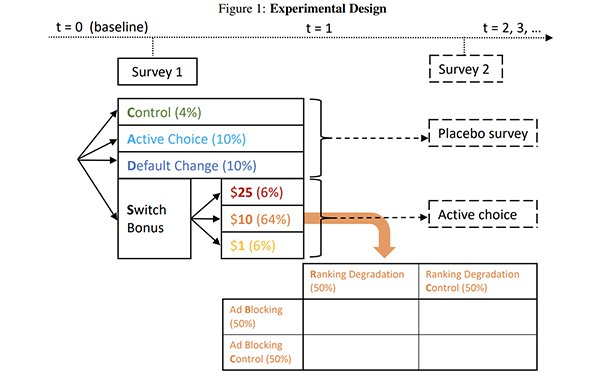
Is Google a habit? Findings from a study suggest many users
stick with Google simply because they never explore other options. When they do, some choose to stay with the competitor, like Microsoft’s Bing. DuckDuckGo and other privacy-based engines were
not mentioned in the research.
The study was conducted by a group of academics who challenged the assumption that Google holds dominance in the search engine market because it’s a better
search engine than others.
Researchers were from The Wharton School University of Pennsylvania, Stanford University, Department of Economics University of Pennsylvania, Department of Economics
Stanford University, and Department of Economics at MIT.
The study seems to sit on the ruling by the U.S. judge who deemed Google illegally maintains its search monopoly by paying companies like
Apple and Mozilla.
advertisement
advertisement
Google pays Apple and Mozilla to make the company’s search engine the default in Safari and Firefox, respectively. Both companies have come out in favor of keeping the
agreements as is.
Based on the findings, policymakers that want to create a more level playing field may need to rethink how default settings and consumer learning through search engines shape
online behavior.
The study was published by the National Bureau of Economic Research.
Findings reveal that many users seem to stick with Google because they never explore other
options. When they do, some choose to stay with a competitor, like Microsoft’s Bing.
The study found most people don’t actively choose Google. They just never switch, which likely
is why Google’s agreements with Apple and Mozilla works so well keeping a large user base. Most users just stick with Google out of habit.
The researchers recruited participants from
March 19-April 2, 2024. The participants were U.S. residents at least 18 years of age.
Survey 1 began with screening questions concerning the participant’s device, web browser, and
search engine use.
A model of search-engine demand was created in which consumer choices are influenced by switching costs, quality beliefs, and inattention, and estimate it using a field
experiment with U.S. desktop internet users, according to the summary.
Researchers during the study asked participants to search for the term “potato” through their browser’s
URL bar and report the search engine that they were directed to use.
Unless users intentionally changed the search engine, it is the browser’s default search engine. The survey then
asked, “What search engine do you usually use on this web browser?” in case users did not usually search via the URL bar.
Participants were divided into different groups. Some were
asked to choose a search engine, while others were paid $10 to switch to Bing. Only 1.1% of Google users voluntarily changed their default when given the choice. When paid to use Bing, 58% switched,
and 33% of them stuck with the Microsoft search engine even after the experiment ended.
The participants who switched said they had either become accustomed to Bing or found it better than
expected.
The study also examined how search quality improves when a search engine processes more user interactions, mostly contributing to better quality through data. The results suggest if
Bing had access to Google’s data, its search quality would improve slightly, but not dramatically.
In Seb Murray’s review of the research study, he wrote the most “effective
intervention might involve changing the default search engine temporarily, followed by a ‘choice screen,” which they provide in Europe. This is where users select a search engine when
setting up a browser or device.
It’s important to note this research was conducted prior to Google and Microsoft increasing their respective use of generative AI search. You can
find the research here.